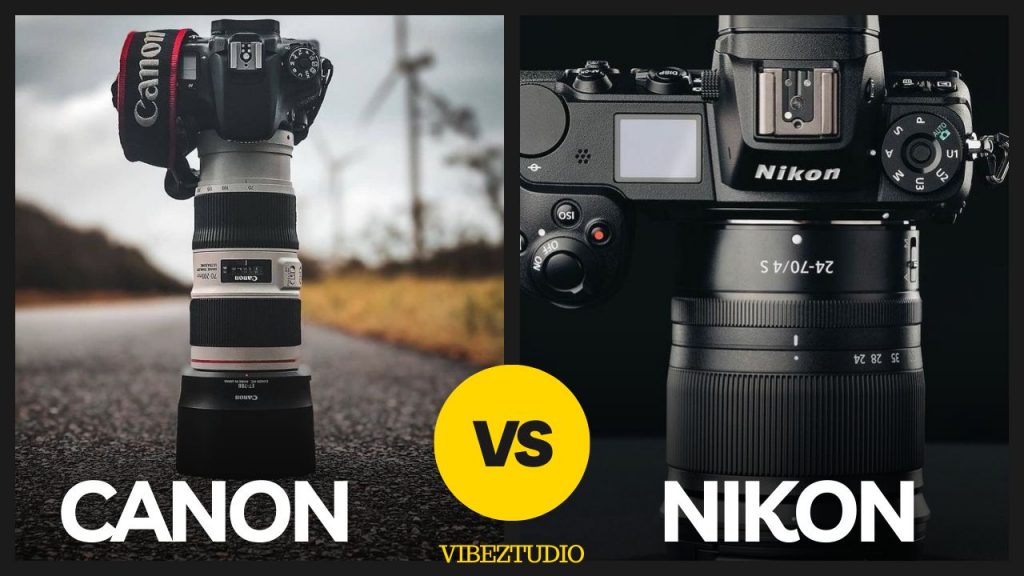
Table of Contents
When it comes to photography, one of the most debated topics among beginners and professionals alike is the rivalry between Canon and Nikon lenses. Both brands are renowned for their high-quality optics and exceptional performance, but which one truly reigns supreme? In this ultimate showdown, we will discuss in deep about Canon and Nikon lenses to help you make an informed decision.
Canon and Nikon have long been regarded as the top players in the camera industry, with a wide range of lens options to choose from. From wide-angle to telephoto, prime to zoom, they offer a vast array of lenses designed to meet the needs of every photographer. But what sets them apart? Which brand offers better image quality? What about autofocus speed and accuracy? And let’s not forget about build quality and price.
In this article, we’ll compare Canon and Nikon lenses across various aspects, such as image quality, versatility, and value for money. By the end, you’ll have a clear understanding of the strengths and weaknesses of each brand, enabling you to make an educated decision when it comes to investing in your photography gear.
So, strap in, grab your favorite camera, and let’s jump into the ultimate showdown of Canon vs Nikon lenses – who will emerge as the true champion?
Understanding Lens Compatibility
Before we jump into the brands, let’s talk about compatibility. Both Canon and Nikon have different lens mounts, which can be a bit confusing for beginners. Canon has EF, EF-S, and RF mounts, while Nikon uses F and Z mounts. Understanding these mounts is crucial because it determines which lenses work with your camera body.
Canon Lens Features and Benefits

Canon has been producing lenses for over 80 years, and their lenses are known for their exceptional performance and build quality. Canon offers a wide range of lenses, from ultra-wide-angle to super-telephoto, and everything in between. One of the biggest advantages of Canon lenses is their image stabilization technology, which is built into many of their lenses. This technology helps to reduce camera shake and produces sharper images.
Another advantage of Canon lenses is their autofocus system. Canon uses a technology called Dual Pixel CMOS AF, which provides fast, accurate autofocus that works well in both photo and video modes. This makes Canon lenses a great choice for photographers who shoot a lot of action or sports.
Canon lenses are also known for their weather-sealed construction, which helps to protect them from dust and moisture. This makes them ideal for outdoor photography in challenging conditions.
Benefits for Specific Scenarios
Canon lenses excel in various photography scenarios. For landscape photographers, Canon’s wide-angle lenses capture stunning view, while portrait photographers can take advantage of the beautifully creamy backgrounds created by their prime lenses.
Nikon Lens Features and Benefits

Nikon lenses are no slouch either. They incorporate Vibration Reduction (VR) technology, which helps reduce camera shake, especially in low light conditions. Nano Crystal Coating is another innovation that minimizes lens flare and ghosting. These features make Nikon lenses an excellent choice for shooting in challenging lighting conditions.
Advantages in Different Situations
Nikon is another brand that is known for producing high-quality lenses. Like Canon, Nikon offers a wide range of lenses that are designed to meet the needs of every photographer. One of the biggest advantages of Nikon lenses is their sharpness. Nikon lenses are known for producing incredibly sharp images, even when shooting wide open.
Nikon lenses also have a reputation for being well-built and durable. Many Nikon lenses are weather-sealed, which makes them ideal for outdoor photography in challenging conditions. Nikon lenses also have a silent wave motor (SWM) that provides fast and quiet autofocus, making them a great choice for shooting wildlife or other subjects that require stealth.
Another advantage of Nikon lenses is their versatility. Nikon offers a range of zoom lenses that cover a wide focal length range, making them great for travel and landscape photography. Nikon also offers a range of prime lenses, which are known for their wide apertures and shallow depth of field.
Image Quality Comparison Between Canon and Nikon Lenses

When it comes to image quality, both Canon and Nikon lenses are capable of producing stunning images. However, there are some differences between the two brands.
Canon lenses are known for producing images with warm colors and a slightly softer look. This can be especially appealing for portrait photographers who want to create a more flattering look for their subjects.
Nikon lenses, on the other hand, are known for producing images with cool colors and a sharper look. This can be great for landscape photographers who want to capture every detail in their scenes.
In terms of sharpness, Nikon lenses are generally considered to be sharper than Canon lenses. This is especially true when shooting wide open. However, it’s worth noting that sharpness is just one factor in image quality, and both brands produce lenses that are capable of producing stunning images.
Sharpness, Color Rendition, and Distortion Control
Image quality can be measured through factors like sharpness, color rendition, and distortion control. Canon lenses are often lauded for their sharpness, making them great for portrait and landscape photography. Nikon, on the other hand, shines in color rendition, ensuring your photos are vibrant and true to life.
Real-World Examples
To put things into perspective, we’ll provide real-world image comparisons between Canon and Nikon lenses, giving you a better idea of what to expect. Remember, image quality isn’t just about the lens but also about the photographer’s skills and post-processing.


Lens Selection Considerations
Now, let’s address the zoom vs. prime lens debate. Both types of lenses have their own set of advantages and considerations, and choosing the right one depends on your photography style and preferences.
| Aspect | Zoom Lenses | Prime Lenses |
|---|---|---|
| Versatility | Cover a range of focal lengths in one lens | Fixed focal length, no zoom capability |
| Convenience | Easier to frame shots without changing lenses | May require frequent lens changes |
| Aperture Options | Some offer variable apertures, e.g., f/3.5-5.6 | Often have wider fixed apertures, e.g., f/1.4 |
| Low Light | Variable apertures may limit low-light performance | Excellent for low-light situations |
| Background Blur | Typically provide less pronounced bokeh | Excellent for achieving beautiful bokeh |
| Portability | Can be bulkier and heavier | Compact and lightweight |
Focal Length
Focal length is another crucial factor. Your choice depends on your photography style. Wide-angle lenses are great for landscapes and architecture, while telephoto lenses excel in sports and wildlife photography.
Aperture
The lens aperture is a key component in low light performance and creative potential. A wide aperture like f/1.4 allows for beautiful bokeh and is ideal for portrait and street photography.
Lens Pricing and Affordability
Budget vs. Quality
The budget is always a consideration. Canon and Nikon offer a wide range of lenses, from budget-friendly to premium. It’s important to find a balance between cost and quality that suits your needs.
Investment in Quality
Keep in mind that lenses are a long-term investment. A high-quality lens can last you for years, while cheaper lenses may need replacing sooner. Don’t break the bank, but don’t cut corners either.
User Reviews and Opinions on Canon and Nikon Lenses

When it comes to buying a lens, user reviews and opinions can be a great source of information. There are many online forums and communities where photographers share their experiences with different lenses.
One thing to keep in mind is that opinions can be subjective. What one person likes may not necessarily be what you like. It’s important to read a variety of reviews and take them with a grain of salt.
Choosing the Right Lens for Your Photography Needs
Your choice of lens depends on your unique photography needs. If you’re a versatile shooter, consider having a mix of zoom and prime lenses. Tailor your lens arsenal to your creative vision.
Personal Recommendations
So, which brand is right for you? The truth is, there is no right or wrong answer. Both Canon and Nikon produce high-quality lenses that are capable of producing stunning images. The choice of brand and lens will depend on your specific needs and preferences.
Before making a purchase, consider what type of photography you’re interested in, what your budget is, and what features are important to you. Do your research, read reviews, and test out lenses if possible. Feel free to reach out to me on Instagram.
Canon vs Nikon: Which Lens Brand Is Right for You?
In the end, the Canon vs Nikon lens battle often comes down to personal preference. Both brands offer excellent lenses with unique features and benefits. Your choice should align with your photography style and budget.
When choosing a lens, consider your specific needs and preferences, as well as factors such as image quality, autofocus speed, and build quality. With the right lens, you’ll be able to take your photography to the next level and capture images that truly stand out. So go hit that Shutter button.

